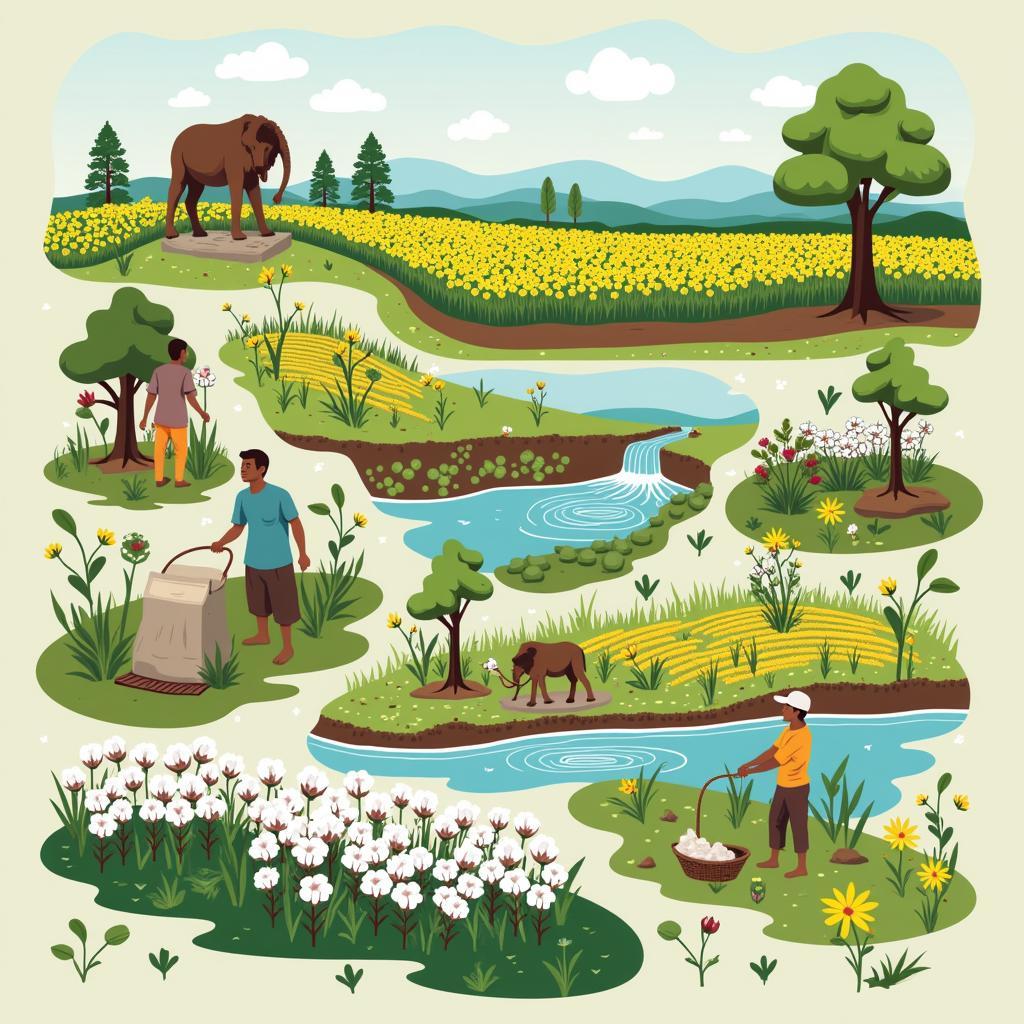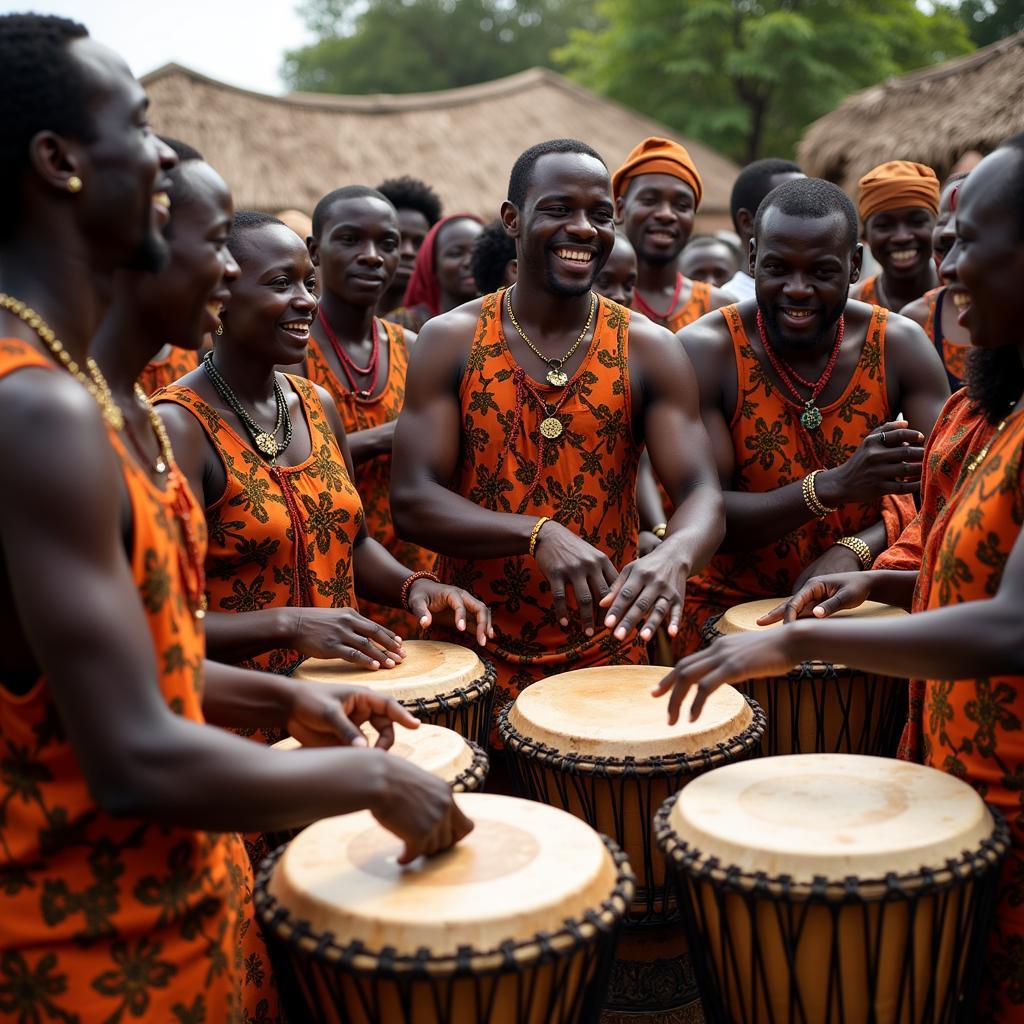Unveiling the Rich Tapestry of African Cotton
African Cotton has a story to tell, a narrative woven through centuries of tradition, innovation, and global impact. From the vibrant wax prints that adorn clothing to the challenges faced by farmers battling the African cotton bollworm, this natural fiber plays a significant role in the economic and cultural landscape of the continent. african cotton wax prints This article delves into the multifaceted world of African cotton, exploring its history, production, challenges, and potential for a sustainable future.
A Historical Journey: From Ancient Origins to Modern Markets
African cotton’s history is deeply intertwined with the continent’s cultural heritage. For generations, cotton has been cultivated and utilized across Africa, from ancient Egypt to the bustling markets of West Africa. Its use extends beyond clothing, encompassing various aspects of daily life, including bedding, fishing nets, and even musical instruments. Archaeological discoveries have unearthed cotton fragments dating back thousands of years, showcasing the long-standing relationship between African communities and this versatile fiber.
The Challenges and Triumphs of African Cotton Production
African cotton production faces numerous obstacles, including pest infestations like the African cotton bollworm, unpredictable weather patterns, and limited access to modern farming techniques. african cotton bollworm These challenges have a direct impact on the livelihoods of millions of smallholder farmers who depend on cotton cultivation for their income. Despite these hardships, African cotton farmers demonstrate incredible resilience and ingenuity, constantly adapting to changing conditions and seeking innovative solutions. Initiatives aimed at improving farming practices, promoting sustainable agriculture, and providing access to global markets offer hope for a brighter future.
Navigating the Global Cotton Trade: Opportunities and Obstacles
African cotton farmers also face challenges in the global cotton trade, including competition from heavily subsidized cotton producers in other parts of the world. african cotton industries This unequal playing field often undermines the competitiveness of African cotton, impacting its market share and profitability. However, there are ongoing efforts to promote fair trade practices and support African cotton producers in accessing international markets.
“Ensuring fair trade practices is essential for supporting African cotton farmers and empowering them to thrive in the global market,” says Dr. Abena Osei-Asare, an agricultural economist specializing in African trade.
Sustainable Futures: Investing in Innovation and Empowerment
Looking ahead, sustainable cotton production is key to ensuring the long-term viability of the African cotton industry. This involves adopting environmentally friendly farming practices, investing in research and development, and empowering local communities. african cotton industries ltd Initiatives focused on organic cotton cultivation, water conservation, and reducing pesticide use are gaining traction across the continent. These efforts not only protect the environment but also contribute to the overall health and well-being of farming communities.
What is the Future of African Cotton?
The future of African cotton hinges on a multifaceted approach that addresses the challenges while capitalizing on the opportunities. This includes fostering collaboration among stakeholders, promoting value addition through local processing, and strengthening regional cotton value chains. african cotton and textile industries federation By investing in innovation, empowering farmers, and ensuring fair trade practices, African cotton can reclaim its position as a vital contributor to the continent’s economic prosperity and cultural heritage.
 Sustainable African Cotton Production
Sustainable African Cotton Production
“The potential of African cotton is immense. By embracing sustainable practices and empowering local communities, we can unlock this potential and create a thriving industry that benefits both people and the planet,” says Kwame Nkrumah, a leading expert in sustainable agriculture.
In conclusion, African cotton is more than just a fiber; it’s a symbol of resilience, innovation, and cultural identity. By addressing the challenges and investing in a sustainable future, African cotton can continue to weave its story into the fabric of global trade and cultural heritage.
FAQ
- What are the main challenges faced by African cotton farmers?
- How can sustainable practices benefit the African cotton industry?
- What is the role of fair trade in supporting African cotton producers?
- What are the potential benefits of strengthening regional cotton value chains?
- How can technology contribute to improving African cotton production?
- What are some of the traditional uses of African cotton?
- What are the key initiatives promoting organic cotton cultivation in Africa?
Common Scenarios and Questions
-
Scenario: A consumer wants to know if their clothing is made from sustainably sourced African cotton.
-
Question: How can I identify clothing made from sustainable African cotton?
-
Scenario: A farmer is looking for information on how to combat the African cotton bollworm.
-
Question: What are the most effective methods for controlling the African cotton bollworm?
Further Exploration
For more information on related topics, explore these resources:
- The Impact of Climate Change on African Cotton Production
- The Role of Women in African Cotton Farming
When you need assistance, please contact us at Phone Number: +255768904061, Email: kaka.mag@gmail.com or visit our address: Mbarali DC Mawindi, Kangaga, Tanzania. We have a 24/7 customer service team.

